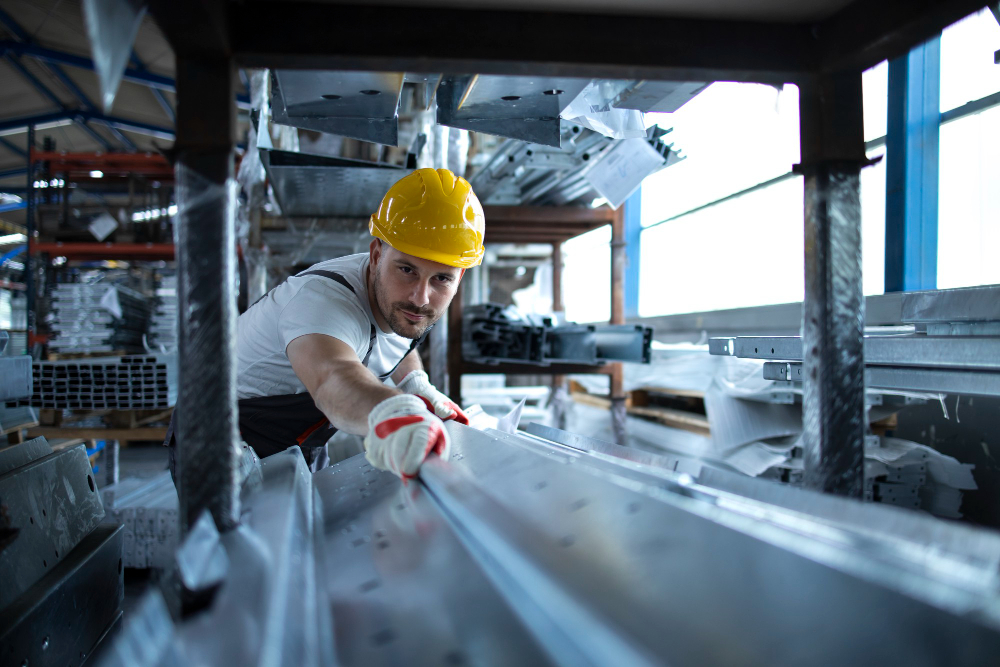Farming practices in the past few years have involved the use of metal barns, simply because they last longer than any other material. Most farmers see metal as far safer than wood. As agricultural practices evolve, so too do the demands on these essential buildings.
It is common to see dilapidated barns in the farms that have been unable to withstand the test of time, so to speak. Not only is wood vulnerable to the elements, but it is also susceptible to pest infestations and water damage.
Farmers, on the other hand, have always relied on sturdy, reliable storage structures to protect their equipment, livestock, and harvests.
Traditional wooden barns have served their purpose well over the years, but they are gradually being replaced by a more modern alternative: metal barns. Durable, cost-effective, and versatile, metal barns are becoming the go-to choice for farmers worldwide.
In this article, the experts at Lion Barns will explore why metal barns are rapidly emerging as the future of farm storage.
Durability and Longevity
One of the most compelling reasons to choose a metal barn is its unparalleled durability. Unlike traditional wooden structures that are prone to rot, warping, and pest infestations, metal barns are crafted to endure the test of time and the elements. Made from materials like galvanized steel or aluminum, these barns naturally resist rust, corrosion, and the damage typically caused by termites and other insects. This durability ensures that the structure remains functional and secure, even in demanding farm environments.
Farm conditions can be particularly harsh, with buildings often exposed to heavy rains, strong winds, snowstorms, and extreme temperature fluctuations. Metal barns are specifically engineered to withstand these challenges. Their robust design provides superior resistance to environmental stressors, preventing damage that might compromise the structure’s integrity. This makes them particularly valuable in areas prone to severe weather events, such as hurricanes or tornadoes, where the strength and resilience of a building can make all the difference.
Beyond weather resistance, the long lifespan of metal barns translates to a better return on investment for farmers. While wooden barns may require frequent maintenance and repairs due to weathering or pest damage, metal barns remain structurally sound with minimal upkeep. Over time, this reduces costs and eliminates the inconvenience of constant repairs. For farmers seeking a reliable and lasting storage solution, metal barns stand out as an investment that combines practicality with peace of mind.
Cost-Effectiveness
Building and maintaining a barn is undeniably a major financial commitment for any farmer. Metal barns, however, present a cost-effective alternative to traditional wooden structures. While the upfront cost of a metal barn might be comparable to or slightly higher than that of a wooden barn, the long-term financial benefits make it a more economical choice. These savings become evident over time as maintenance and repair expenses for metal barns are significantly lower than those for wooden ones.
One of the primary reasons metal barns are more cost-effective is their low maintenance requirements. Unlike wooden barns, which require periodic treatments to prevent rot, decay, and pest infestations, metal barns are inherently resistant to these issues. This eliminates the need for expensive chemical treatments or structural replacements due to termite damage or wood deterioration. Farmers can also avoid the frequent painting or sealing often necessary with wooden barns, further saving time and money.
Additionally, the prefabricated design of many metal barn kits accelerates the construction process, reducing labor costs. These kits come with pre-engineered components that are easy to assemble, meaning farmers can have a fully functional barn in a fraction of the time it would take to construct a traditional wooden structure. Once built, metal barns are less prone to requiring major repairs or replacements, as their durable materials withstand harsh weather and heavy use. This combination of reduced construction time, lower maintenance demands, and longer lifespan makes metal barns a financially sound investment for any farming operation.
Eco-Friendliness
Sustainability is an increasingly important consideration in modern agriculture. Metal barns align well with eco-friendly practices, as they are often made from recyclable materials. Steel, in particular, can be recycled multiple times without losing its strength or quality, making it a sustainable choice for farm storage.
Additionally, metal barns can be designed to accommodate energy-efficient features, such as solar panels, skylights, and proper insulation. These features not only reduce the environmental footprint of the farm but also lead to lower energy costs. For farmers striving to balance productivity with sustainability, metal barns are a practical solution.
Customizability and Versatility
Modern metal barns offer a level of customizability that traditional wooden barns often lack. Whether you need a structure to house livestock, store hay, or shelter expensive machinery, metal barns can be tailored to suit your specific needs.
Farmers can choose from a range of sizes, layouts, and additional features. Insulated walls, ventilation systems, and durable flooring can be added to enhance functionality. Windows, doors, and partition walls can be customized to create specialized areas within the barn. This versatility makes metal barns an ideal choice for diverse agricultural applications.
Weather Resistance
Weather can wreak havoc on farm structures, especially in regions prone to heavy snowfall, hurricanes, or extreme heat. Metal barns are designed to handle these challenges better than wooden barns. The arched roof design of many metal barns allows snow to slide off easily, preventing structural damage from heavy snow loads.
In hot climates, reflective metal surfaces help reduce heat absorption, maintaining a cooler interior. Additionally, the fire-resistant properties of metal add an extra layer of protection, particularly important in areas susceptible to wildfires. For farmers, investing in a weather-resistant structure means fewer repairs and less downtime.
Ease of Construction
Time is a precious resource on any farm, and the quicker a barn can be built, the better. Metal barns often come in prefabricated kits that are easy to assemble, even for those with minimal construction experience. These kits include all necessary components, such as steel frames, panels, and fasteners, as well as detailed instructions.
The streamlined construction process reduces the time and labor required to build a metal barn. In many cases, farmers can erect a metal barn in a matter of days, compared to weeks or months for traditional wooden barns. This efficiency allows farmers to focus on their core operations rather than being bogged down by lengthy construction projects.
Low Maintenance Requirements
Maintenance is a constant concern for farmers, and wooden barns often demand a significant amount of upkeep. From repainting to replacing damaged boards, the costs and effort can quickly add up. Metal barns, by contrast, require very little maintenance.
A simple routine of occasional cleaning and inspections is usually sufficient to keep a metal barn in top condition. The galvanized steel used in most metal barns resists rust and corrosion, while the durable panels can withstand dents and scratches. This low-maintenance nature frees up time and resources for other farm activities.
Improved Livestock Welfare
For farmers who raise animals, the welfare of their livestock is a top priority. Metal barns can be designed to create a comfortable and safe environment for animals. Insulated panels help regulate temperature, while proper ventilation systems ensure a steady flow of fresh air.
Additionally, the durability of metal barns means fewer sharp edges or splinters that could injure animals. By providing a secure and well-ventilated space, farmers can promote healthier and more productive livestock.
Enhanced Security
Farm equipment and harvests represent a significant investment, and protecting them is essential. Metal barns offer a higher level of security compared to wooden barns. The sturdy construction and lockable doors make it difficult for unauthorized individuals to access the contents of the barn.
For added security, farmers can install features such as reinforced doors, motion-sensor lighting, and surveillance cameras. These measures help deter theft and vandalism, providing peace of mind.
Aesthetic Appeal
While functionality is the primary concern for farm storage, aesthetics also play a role in modern farming. Metal barns are available in a variety of colors and finishes, allowing farmers to choose a design that complements their property.
The sleek, modern look of metal barns can enhance the overall appearance of a farm, making it more visually appealing. This can be particularly beneficial for agritourism ventures, where the aesthetic value of the property contributes to the overall experience for visitors.
Conclusion
Metal barns are rapidly becoming the future of farm storage, offering unparalleled benefits in terms of durability, cost-effectiveness, and versatility. Their ability to withstand harsh weather conditions, combined with low maintenance requirements and eco-friendly features, make them an ideal choice for modern farmers. Whether you’re looking to store equipment, house livestock, or create a functional workspace, a metal barn provides a reliable and long-lasting solution.
As agriculture continues to evolve, so too must the tools and structures that support it. Metal barns represent a forward-thinking approach to farm storage, combining practicality with innovation. For farmers seeking to invest in the future of their operations, metal barns are a choice that promises to deliver value for years to come.

